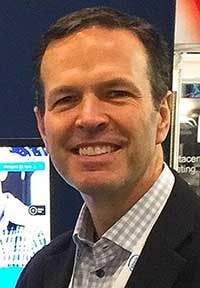Executive Insights: Jeff Klaus of Intel 4Q 2020
The Data Center Frontier Executive Roundtable features insights from industry executives with lengthy experience in the data center industry. Here’s a look at the insights from Jeff Klaus of Intel.
JEFF KLAUS, Intel Corp.
As General Manager of Intel Data Center Software Solutions, Jeff Klaus leads a global team that designs, builds, sells and supports Intel DCM, the only software that provides real-time, server-level data on the power and thermal conditions across a wide range of data center servers and other equipment. Provided as an SDK, Intel DCM middleware is integrated into Data Center Infrastructure Management (DCIM) consoles to increase data center power and thermal efficiency.
Since joining Intel in 2000, Klaus’ accomplishments have been recognized by multiple division awards. With a broad background in software solutions for the channel, client and SMB space, he has served as Director of Media Programs within Intel’s Digital Home Group, Entertainment Content Marketing Manager, Business Operations Manager, and Software Marketing Manager.
An accomplished speaker, Klaus has presented at such industry forums as Gartner Data Center Summit, AFCOM’s Data Center World, the Green IT Symposium, and the Green Gov conference. He has authored articles on data center power management in Data Center Post, IT Business Edge, Data Center Knowledge, Information Management and Data Centre Management. Klaus currently serves on the Board of Directors for the Green IT Council. Klaus earned his BS in Finance at Boston College and his MBA in Marketing at Boston University.
Here’s the full text of Jeff Klaus’ insights from our Executive Roundtable:
Data Center Frontier: The COVID-19 pandemic has defined much of 2020. As we enter 2021, what pandemic-related changes are likely to have lasting impact for the data center industry, and why?
Jeff Klaus: The push to cloud services has been significant and will continue next year. I don’t see any competing force to change that direction at the moment. Also, I think companies will continue to have challenges in retaining talent and finding new people with the appropriate cloud skills, so companies will need to get creative with incentives and recognition to build loyalty.
Finally I think security will be a larger challenge considering the rush to cloud and continued profit derived from attacks.
Data Center Frontier: Gartner says many enterprise customers are holding off on major IT spending during the pandemic. Will that continue in 2021? Or will the “digital shift” from COVID-19 prompt enterprises to invest in retooling their infrastructure?
Jeff Klaus: More organizations will see the benefit of their 2020 investments in online, cloud and virtual workplace or learning. We may see this continue into ’21 as organizations see the ROI (return on investment) from these moves and make some initiatives permanent. There is also thought about “when this happens again” we’ll be more prepared, which could lead to additional investments. We also see 5G continuing to drive investment as many industries begin to learn about edge computing benefits.
Data Center Frontier: Hyperscale customers are more focused than ever on sustainability and climate change. Will this renewed focus drive meaningful change in the data center industry? If so, what might that look like?
Jeff Klaus: Hyperscale will continue to be on the lookout for viable data center floor space. I think sustainability will continue to be one of the top criteria, but it will remain as one of a set of criteria that help the customer perform efficiently and responsibly.
Hopefully with the US administration change we see more substantial incentives or guidance which accelerates this trend. Ultimately accelerated adoption will occur once the appropriate business cases are solved for ensuring that sustainability is the most profitable path.
Data Center Frontier: What will be surprised by in 2021? What are the trends you’re following that will make an outsized impact?
Jeff Klaus: I think we’ll see even more growth from 5G as we start to really see innovations in transportation and healthcare take off. As people recognize that we can innovate faster in these areas when we have better connections and data, we’ll see a lot more consumer products that have some smart services (with an AI component) connected to it.
